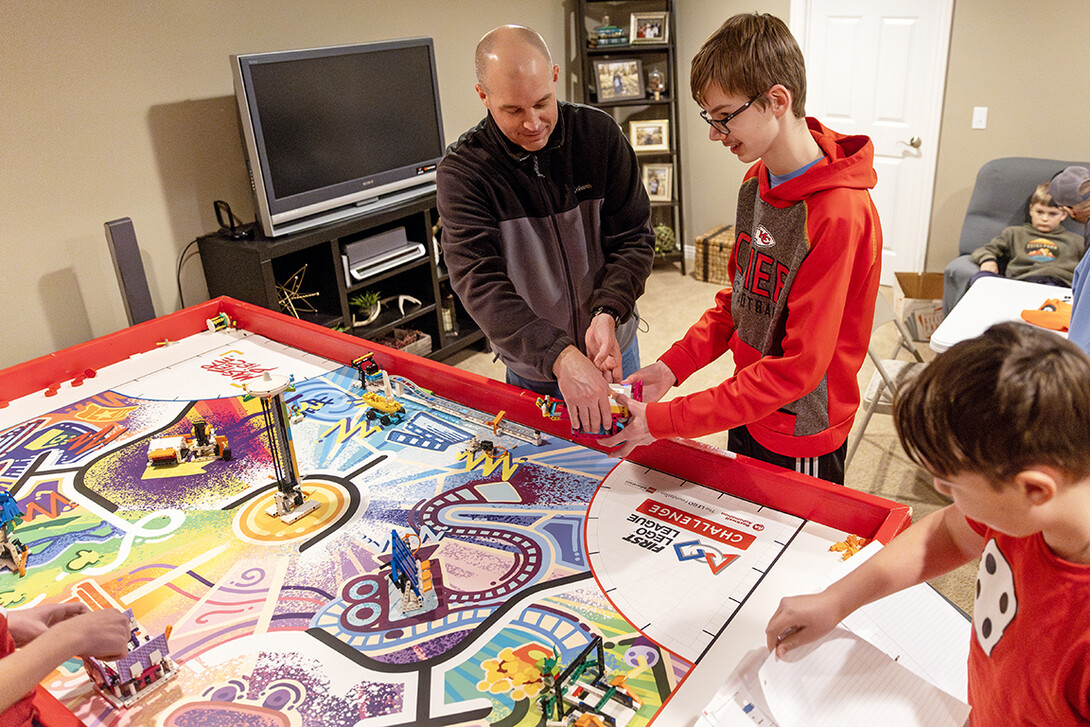
A University of Nebraska–Lincoln program is helping hundreds of youth statewide build robotics skills one brick at a time.
Coordinated through Nebraska 4-H, part of the university’s Institute of Agriculture and Natural Resources, the FIRST Lego League features youth in grades 4 through 8 teaming up to solve robotics challenges using the classic building block toy. Participants in the annual program learn design, engineering, programming and teamwork skills while dipping their toes into potential career paths.
“We’re hoping to plant a seed for these students of, ‘What I’m doing for fun right now could be a career later for me as I grow older,’” said Keith Mandachit, a longtime volunteer with the program. “When they graduate high school and head for college trying to figure out what they want to do, maybe that seed grows into wanting to do something related to programming or robotics.”
During competitions each spring, teams focus on a central theme linked to a specific challenge. They are ultimately judged on their research into the theme, demonstration of the program’s core values, robot design, and tasks completed on a robotics playing field. The tasks can include programming the robots to pick up an item, move it to a specific spot and maneuver around various obstacles.
This spring, 80 teams made up of 576 youth and 198 coaches are participating in the FIRST Lego League in Nebraska. They will come together to compete at the state tournament, which will be held over two days in March in Lincoln. Leagues and competitions can be global, too. FIRST — For Inspiration and Recognition of Science and Technology — is an international youth organization that operates the FIRST Robotics Competition, FIRST Lego League Challenge, FIRST Lego League Explore, FIRST Lego League Discover and FIRST Tech Challenge competitions.

Mandachit got involved with FIRST Lego League in 2009 when his kids were getting old enough to join. At the time, the program was new to Nebraska. Mandachit coached his sons’ team as a 4-H club and has continued to volunteer at tournaments in various capacities since that time, primarily as a scorekeeper.
Mandachit, who is an electrical engineer with Huffman Engineering, said programming skills the kids learn are directly related to skills he uses in his career.
“When I see these students programming a Lego robot to perform a task, it’s very applicable to what I do,” he said. “Instead of making a Lego robot do something, we’re automating pharmaceutical processes, food manufacturing, wastewater treatment plants. We’re doing programming just like they are.”
The kids use a computer to program commands that are then loaded into a hub in the robot. They use Lego bricks to construct a body for the robot, as well as attachments used to complete tasks. The commands direct the robot to move forward or backward at the distance the kids measure or move attachments to complete tasks.
Jordan Dowdy, who coaches two teams, N-Bots Robostrike and N-Bots Robothunder, said the teams practice running their robot and record how their scores progress.
Alongside the more recognizable robotics game, teams also must identify a problem related to the theme and research a possible solution to that problem. Mandachit compared it to a science fair project and said students are encouraged to meet with professionals in a relevant field to get information about their problem. Participants must present to a panel of judges and answer questions.
Dowdy said the teams work on each stage of the competition, from research to design to testing, at each weekly meeting.

This year’s theme asks participants to use arts and technology to interest others in a hobby of their choice. For their research project, one of the teams Dowdy coaches built a video game where players use a Lego fishing rod to practice fishing and learn about each species caught. The team will meet with a Nebraska Game and Parks representative to develop the idea.
Working with two different age groups, Dowdy said each experience level comes with its own challenges. He said the older team tends to be more polished because they’ve had the practice from previous years. However, sometimes they need to keep their more complicated designs and programs simple enough that they will be able to troubleshoot quickly if something goes wrong.
For the younger members, Dowdy said the biggest challenge is getting them to collaborate with each other as they’re learning to listen to each other’s ideas and talk through the best solutions.
“They’re at an age when they’re still understanding the teamwork concepts,” he said. “You just can’t do what you want by yourself, you’ve got to work with everybody else.”
Dowdy is in his second-year coaching and his first year as a head coach. Dowdy said FIRST Lego League was an opportunity for his son to participate in an activity that teaches teamwork skills while doing something he enjoys.
In his observation, Dowdy said many of the participants have more introverted personalities, and the group work helps each child come out of their respective shell. He said his son was shy when he joined and the program helped him open up.
“He had to learn to find his voice,” Dowdy said. “For a younger team to be in front of judges for 30 minutes with their presentation can be pretty challenging and somewhat intimidating.”
The FIRST Lego League also helps spark an interest that may carry participants to a related career. Mandachit said the league helps create a passion for STEM fields and shows Nebraska youth possible paths for their education and professional life.
“As a kid, I would have loved this,” he said. “As they’re building this Lego robot, they’re doing engineering, whether they know it or not. That’s the kind of spark this program provides. They’re capitalizing on the fun aspect but correlating it to a possible career at the same time. And why not? If you really like this, why not do it for a living?”







